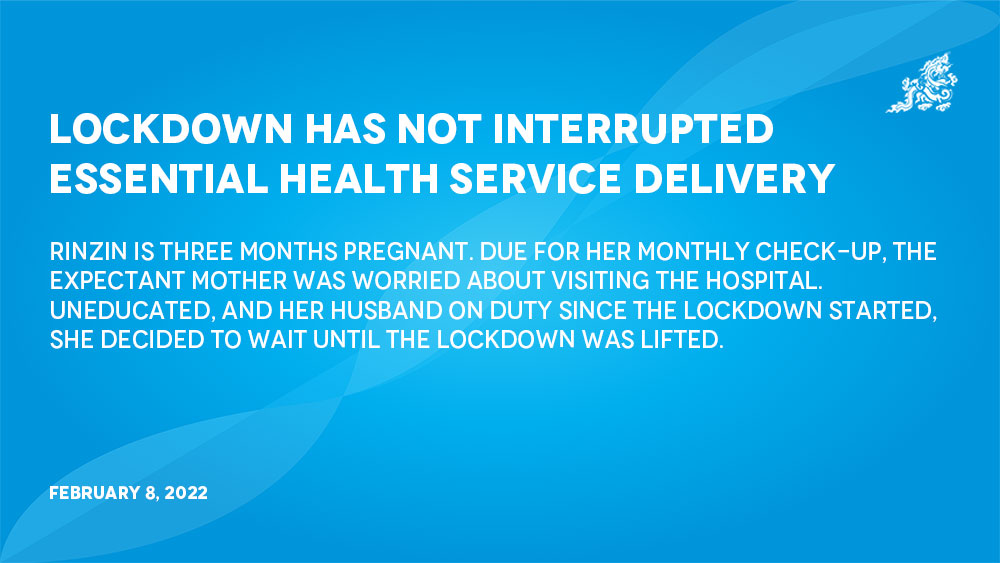Dechen Dolkar
Rinzin is three months pregnant. Due for her monthly check-up, the expectant mother was worried about visiting the hospital. Uneducated, and her husband on duty since the lockdown started, she decided to wait until the lockdown was lifted.
Last week, she got a call from the Gyaltsuen Jetsun Pema Wangchuck Mother and Child Hospital to come for her routine monitoring. Her neighbour helped her visit the hospital.
“It was easier than during normal times,” said Rinzin, 29, who spent about 30 minutes in the hospital. “The hospital was quiet and it was well organised. I am so grateful that they called me to come,” she said.
The more than three-week lockdown may have caused inconveniences, but delivering essential health services is one area that has not been interrupted by the lockdown.
Essential health services include important services like vaccination, chemotherapy, dialysis, reproductive health services including care during pregnancy and childbirth, refilling of medicines, and outpatient department teleconsultations.
According to the essential health services focal person, Hari Prasad Pokhrel, for essential health services with the Ministry of Health, they have been providing and delivering all the essential services to the people under lockdown and high risk areas from their respective health facilities.
However, he said that chemotherapy services are available only in Thimphu at the national referral hospital. Dialysis units are available in five dzongkhags: Thimphu, Mongar, Phuentsholing, Gelephu, and Wangdue.
Hari Prasad said that for the chemotherapy services, they have the details for patients, including contact numbers and the appointment dates, maintained at chemotherapy units.
Patients in Thimphu are informed about their appointments a day ahead of time and instructed to undergo the required blood test and RT-PCR. For those with vehicles, patients themselves manage the movement and for those without vehicles, Bhutan Cancer Society helps with the movement of patients.
He said that they have a list of all chemotherapy patients outside Thimphu, along with contact numbers, addresses, and appointment dates on a weekly basis. “They are called and instructed to get a blood test and RT-PCR two days in advance.”
He said that they request the dzongkhag task force to issue travel permits for patients with their own vehicles and respective dzongkhags are requested to arrange transportation.
Patients coming from the red zones are treated at a Covid-19 relocation ward.
Most of the patients availing the chemotherapy services are in Thimphu. On average, five to seven patients avail the service each day.
Dialysis services are provided in five dzongkhags. In Thimphu there are five dialysis locations at JDWNRH, one each at the isolation ward, ICU, inpatient department, OPD, and relocation ward.
“On average, around 50 patients are provided services in these five locations combined,” he said
Patients coming from the red zone are treated at the relocation ward at JDWNRH. Patients are given their next appointment after the dialysis session. “If people have no vehicle, transportation is arranged by the Bhutan Kidney Foundation.”
He also said that refilling of medicines and other basic services are provided from the thromde health centres, as people are allowed to walk within their own megazones. Teleconsultation and medicines are delivered to thromde health centres.
“If the patients require a physical checkup, they are asked to visit the health facility centres.” he said.
In areas where there are no thromde health centres, The Bhutan Red Cross Society coordinates with JDWNRH and provides home delivery.
For gewogs, medicines are collected by dzongkhag health officers and sent to health facilities. People come to health facilities for refills, as people are allowed to walk in their own gewogs.


